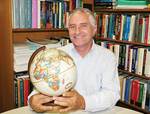Tackling the world's top problems
 Economics Economics
University of Adelaide international trade economist Professor Kym Anderson is taking part in a global project to find the best solutions to the world's biggest challenges. Professor Anderson and nine other authors will face a panel of leading international economists, including five Nobel Laureates, at the Copenhagen Consensus 2008 in Denmark from 25-30 May, to rank priorities for action to solve these problems. Professor Anderson was Lead Economist for Trade Policy at the World Bank from May 2004, until he returned to the University of Adelaide's School of Economics in August 2007 as George Gollin Professor of Economics. At the Copenhagen Consensus, he is the lead author of a paper analysing one of the 10 "biggest challenges": reducing trade and migration barriers. The other challenges are: air pollution, conflicts, diseases, education, global warming, malnutrition and hunger, sanitation and water, terrorism, and women and development. His paper, with co-author Professor L. Alan Winters of the University of Sussex, analyses costs versus benefits of liberalising global trade and international migration. Professor Winters is also a Senior Affiliate of the University of Adelaide's Centre for International Economic Studies. "We are looking at the economic consequences of trade reforms and, in a parallel way, what would happen if we opened up markets to the movement of workers from poor to rich countries at a slightly faster rate than has happened in the past," said Professor Anderson. "If you had $75 billion to spend solving the world's 10 biggest problems, we want to see how much bang for your buck would result from addressing them with the opportunities currently available. And we're looking at how the benefits net of costs would rank against other actions, such as eradicating malaria or boosting education." The paper concludes that multilateral gradual reductions in subsidies and trade barriers, and in restrictions on the international movement of labour, would yield huge economic benefits at relatively little economic cost, and would contribute enormously to reducing global inequality and poverty including via faster economic growth. The World Trade Organization's Doha round of negotiations is already aimed at liberalisation of global trade. "The opportunity to achieve these trade reforms is sitting there before us with the Doha multilateral trade negotiations," said Professor Anderson. The Copenhagen Consensus paper is based on Professor Anderson's World Bank work on global modelling of the economic consequences of various possible outcomes of the trade negotiations, as well as Professor Winters's analysis of migration. Meanwhile, Professor Anderson is completing a major study on the long history of agricultural and trade distortions over the past half-century, covering 75 countries and 90% of the world's economy. Seven books will be published from this work. Professor Anderson is the foundation Director of the University's Centre for International Economic Studies. Recently, along with the Executive Director of the University's Institute for International Trade, Dr Andrew Stoler, he was appointed to an expert group investigating Australia's approach to free trade agreements as part of Trade Minister Simon Crean's review of Australia's export policies and programs. Story by Robyn Mills
|





